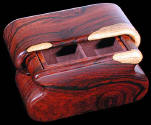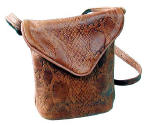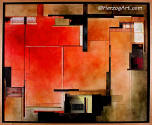 |
|
|
|
|
|
click here
for updated information
tips
on photographing your own artwork
using lighting products that use daylight florescent bulbs. |
|
examples of
my jury slide photography |
| |
|
The Equipment *
The Sets * Photographing a
Painting * Summary *
Links |
| |
|
The Equipment |
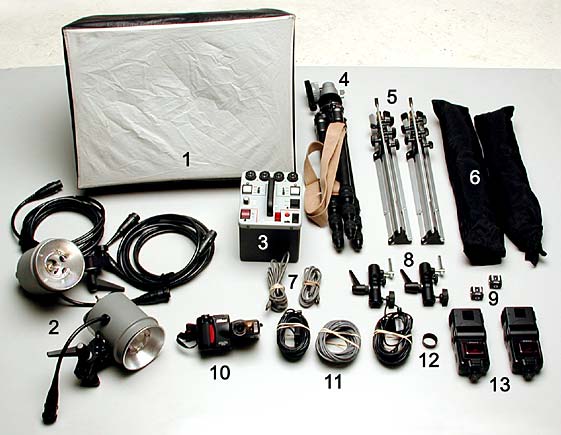 |
- Chimera Soft Box
- Dynalite Flash Heads and Cables
- Dynalite 1000 watt second Power Pack
- Tripod
- 2 Light Stands
- 2 Umbrellas
- Nikon Sc-18 and SC-19 flash cables
- Bogen (part # 2905) Swivel Umbrella Adapter
- 2 Nikon AS-10's (AS-E900 can also be used)
- Nikon CoolPix Digital Camera
- Assorted Paramount Synch Cords with Nikon proprietary
fittings
- Lens Hood from RX
- 2 Nikon SB Flash Units
|
|
Top of Page |
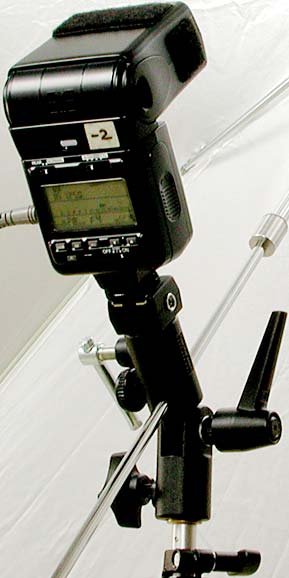 |
|
The Bogen Swivel Umbrella Adapter is the
key because it allows you to use your existing flash unit with an
umbrella and control the direction of the light. The Nikon
AS-10 fits between the adapter and the flash. Just barely
visible is the setting that I use on the flash. When shooting
digitally, I prefer to set the flash units to manual and use
incremental power settings until the image looks correct on the
camera's LCD screen. |
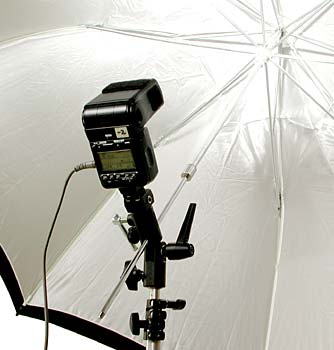 |
|
Top of Page |
|
The Sets |
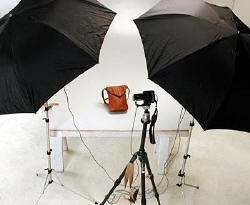
Dual Umbrella Lighting Set Up |
|
The same dual umbrella lighting with SB-24's was used for the
leather handbag and the wooden box. Because of the reflective surface
of the wood, I eventually had to shoot with the box on a piece of
black velvet so the front wouldn't wash out. Don't let the complexity
of the professional Dynalite system scare you. The same results
can be achieved by using either the Nikon SB's or your own flash units. |
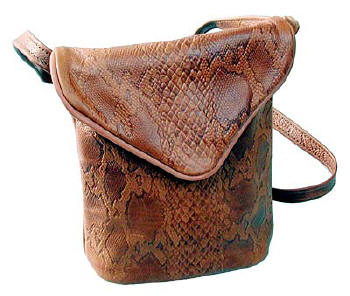
Leather Handbag Provided by
Mark Mowen |
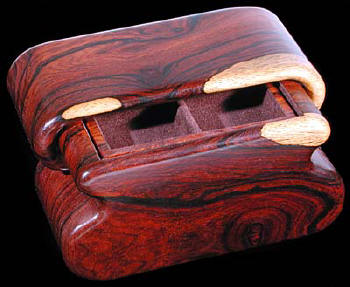
Wooden Box Provided by
Nick Molignano |
|
Top of Page |
|
Photographing a Painting |
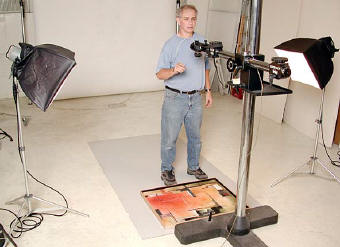
Dave Smith Photographing a Painting |
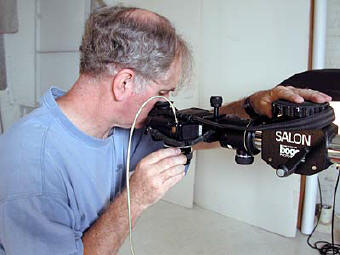 |
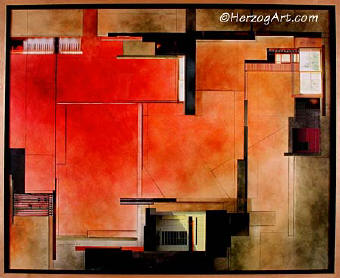
Painting provided by
Ginny Herzog
The resulting picture from my CoolPix set up
using the same camera angle and lighting
that Dave Smith used. |
|
Pittsburgh photographer
Dave Smith helped me set up
these illustrations. To photograph the painting Dave
uses a camera stand (he only uses a tripod when on location) and
normally would shoot with a Nikon F4 with the macro lens and a
grid screen to visually keep the painting squared to the camera. He
also prefers to use Chimera soft boxes (at 45 degree angles)
instead of umbrellas to control the direction and fall off of the
light. It is important to note
that when the required output is a billboard sized image, he switches
to his 4x5 view camera.I took the accompanying photograph of the
painting with my CoolPix from the same position on the camera stand.
If I were to shoot the same picture at home, I
would set the camera on my tripod with a right angle column and use a
level on my CoolPix to keep it square to the floor. Then I
would bounce my Nikon SB-24's into two matching umbrellas the
exact same distance to the painting at 45 degree angles. One of the
pitfalls of shooting a rectangular object with a digital camera is the
slight barrel distortion that is visible in the frame around the
painting. A greater
distance from the camera and a telephoto setting might have lessened
the effect. There is a
Photoshop plug in to correct barrel distortion from Andromeda.
Note that I have added the artist's copyright to the image to help
keep it from being "borrowed". |
|
Top of Page |
|
Summary |
|
As you experiment with the equipment you
already own, you'll find that there is more than one way to take the same
photograph. For years, we've been recommending using window light or open
shade to photograph your art work. If you sell your work at art shows you
already own a wonderful light tent, your canopy. It's white color lets
soft light through and it's perfect for this kind of photography where
harsh shadows are undesirable.
|
To convert your digital files to 35mm slides, follow these
steps:
1- Shoot at full resolution that the camera is capable of.
2- Come in as close as you can, still leaving enough room for 35mm
proportion without cropping.
3- Call your local lab or service bureau to find out their requirements.
Our lab requires a file that is sized to 35mm proportions (7.33x11) and converted to
an 8 megabyte TIF. I've added the information for two labs we're familiar
with to the links list. |
|
Links |
 |
"Secret of Lighting on Location"
by Bob Krist ISBN
0-8174-5823-9
 | Aside from the how-to diagrams and picture examples, he describes
the choices he's made in his lighting purchases and why he made them,
including the cases he travels with. |
|
 |
"Adventures in Location Lighting" by
Jon Falk
 | Jon has informed me that the book is out of print. |
 | It appears to be self published and sponsored by the Eastman Kodak
Company. My copy is from 1990 and is the fourth edition. |
 | A great resource to professional photographers who travel. He
thoroughly describes both battery operated flash systems as well as AC
(or generator) powered systems. |
|
 |
Bogen |
 |
Dyna-Lite
 | I own two Dyna-Lite systems and have used them for over 20 years |
|
 |
Chimera
Soft Boxes |
 |
Paramount
Synch Cords |
 |
RX
Accessories sell a lens hood for the CoolPix |
 |
Nikon Equipment can be purchased from any Nikon professional dealer |
 |
Andromeda
Lens Doc Photoshop filter for barrel distortion correction |
 |
Foto 1
Imaging located in Detroit and Ann Arbor
 | Some of our clients use the Ann Arbor location for digital imaging |
|
 |
Filmet located
in Pittsburgh
 | I've been using Filmet for my digital imaging needs |
|
|
The following people helped out in the production of this page:
(all the contributing artists have done their own photography for
their web sites) |
| |
Digital Photography Resources
Top of Page
Web Site Contents |


